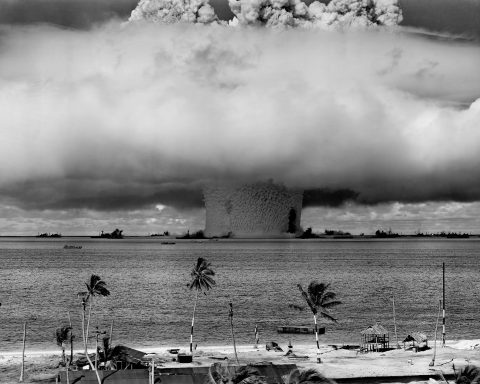
On February 1, 2019, the United States withdrew from the Intermediate Nuclear Forces Treaty (INF). Signed in 1987 during the Reagan administration, the INF treaty was one of several treaties that dramatically reduced the Soviet and American nuclear arsenals (for a graph showing these remarkable reductions, click here), instituted trust-building measures, inspection regimes, and secured fissile material. The INF Treaty banned land-based, tactical nuclear weapons – more specifically ballistic and cruise missiles with ranges between 300 to 3,400 miles (nuclear and non-nuclear).
The administration gave two reasons for this withdrawal. First, there has been longstanding concern that the Russians were violating the treaty and had deployed tactical nuclear weapons. The Obama administration first raised these concerns in 2013 and got nowhere in the face of Russian denials. In 2017 the Trump administration arguably countered Russian non-compliance with a series of integrated diplomatic, economic, and military actions. In 2018 they threatened to withdraw if Russia did not comply with the treaty.
A second reason, advocated by hawks in the Trump administration, is that the INF makes it impossible for the United States develop and field missiles to counter Chinese missile threats. (China is not a treaty signatory.)
Reaction to our withdrawal by enemies and allies alike has been negative. Russians responded by announcing that they will also withdraw from the treaty and develop new weapons. They also cast doubt on future renewals of the Strategic Arms Reduction Treaty, which expires in 2021. European leaders, who credit the INF treaty for keeping Europe free of battlefield nuclear weapons, have expressed alarm at the possibility of a new nuclear arms race on their doorstep. A survey indicated that a majority of Americans did not approve of this move.
___________________________________________
Going forward we need to engage all nuclear powers in constructing structures of transparency and accountability that would make the world safer.
___________________________________________
How should Christians respond?
Helpfully, the last General Assembly (2018) the PCUSA rededicated the church to the goal of denuclearization. While I share that resolution’s desire to eradicate these terrible weapons from the face of the earth, I have two concerns about the resolution. The first is that it was overly optimistic about the possibility of eliminating nuclear weapons. Eliminating nuclear weapons is a heavy lift. Given that wealthy countries, like Japan, estimate that they can build a nuclear weapon in two years and that poor countries, like North Korea, have built these weapons, global nuclear security will require intrusive inspection regimes. Enforcing these sorts of inspections will require military force, which seems to exceed the capacity of the current global order. This is not a counsel of despair, but cold realism about the difficulty of the task before us. A proposed treaty to ban all nuclear weapons has received no support from any nuclear armed state.
My second concern was that the PCUSA resolution was so focused on a nuclear free horizon, that it gave short shrift to the interim task of setting up stable, transparent, and reliable systems of deterrence (inspection regimes, hot-lines, de-targeting weapons, trust-building exercises, etc.). It is a noble thing to eliminate nuclear weapons, but until that day comes we must do all we can to ensure they are never used.
The collapse of the INF treaty reminds us what is at stake in the interim task of peacemaking and deterrence. Russian violations of the treaty remind us just how difficult peacemaking work is. Russian officials claimed their missile could not travel 300 miles and was, therefore, permissible. We claimed it could do more, based on intelligence findings. Similarly, they charged that anti-missile systems we deployed in Eastern Europe violated the INF treaty because they can be used offensively, a claim we denied. The structures of the treaty were incapable of resolving such questions. Future treaties need better methods of confirming and comparing weapons under development and resolving disputes.
While I almost never agree with John Bolton, he and other hawks in the Trump administration do have one point: nuclear treaties need to include all nuclear powers. I would much rather that they had moved to include China in the INF treaty, rather than exiting the treaty. However, treaties that do not include all parties are going to be unstable. Going forward we need to engage all nuclear powers in constructing structures of transparency and accountability that would make the world safer.
It would have been better, in my opinion, to acknowledge that the existing treaty had flaws and work to mend them. We should have instituted protocols to resolve disputes and tried to include all nuclear powers. Neither task would have been easy, but I fear exiting the INF treaty makes them harder. It also makes updating our (dangerously old) nuclear forces much more difficult, as doing so threatens to provoke a response.
We should not want another arms race. That the Russians immediately responded by signaling that they are going to create weapons the treaty prohibited, is troubling. I fear we are in an arms race already. That is tragic, not only for the sinful wastefulness of it, but for the danger it poses the planet.
Nuclear deterrence has been a major part of U.S. strategy since the Cold War. But deterrence means threatening indiscriminate slaughter, which violates the classic rules of war, which is precisely why treaties are needed—treaties are a safer and more just way to prevent nuclear escalation. As we look forward, we should not to forget that the goal of deterrence is just that—a goal. It need not be the sole guide for our thinking. We should resist fear mongering and talk of “missile gaps.” We do not need to match an opponent weapon for weapon. We only need enough of the right type of weapons to provide a credible deterrence. As we move forward we should make certain that we do not inadvertently provoke nuclear proliferation by rousing those who currently rely on the United States’ nuclear umbrella to develop their own nuclear weapons.
It is hard not to feel that the cause of peace faced a grievous setback when the Administration abandoned the INF treaty. At this point, the decision seems unlikely to be reversed. However, if we learn these lessons and share them widely, perhaps a new set of nuclear agreements can be built on a more solid foundation. That should be our prayer and work.
Author Bio: The Rev. Dr. Raymond Roberts is pastor of River Road Presbyterian Church in Richmond, VA. He attended Columbia Theological Seminary and received a Ph.D. in History and Theology from Union Theological Seminary. A former member and co-chair of ACSWP, Ray is also an active member of the Society of Christian Ethics.





Unbound Social